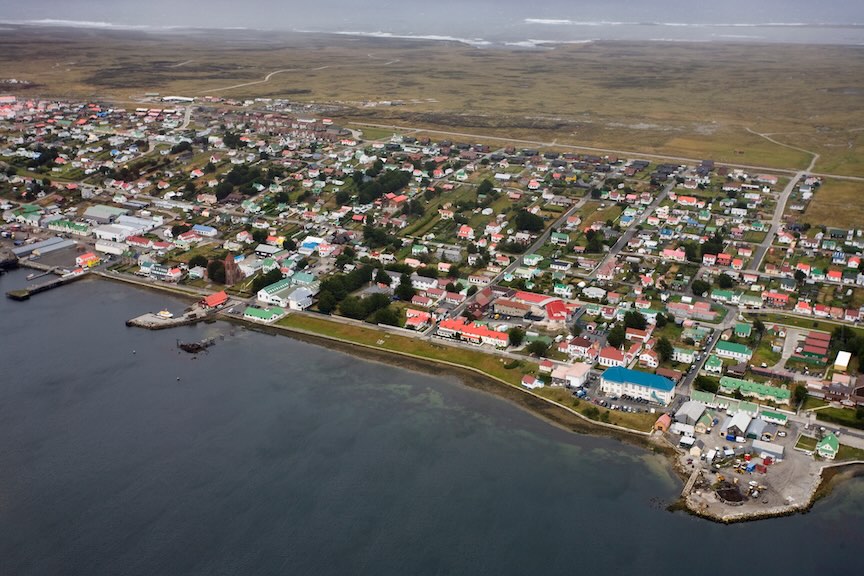
On April 2nd, 1982 the Argentinean military seized the Falkland Islands off the coast of Argentina. The Argentineans claimed the islands were part of Argentina and renamed them "The Malvinas". The British government announced that they would send a task force to recapture the islands.
On May 21st, the first British troops landed on the Falklands and rapidly defeated the Argentinean forces. The British lost 225 servicemen and the Argentineans lost 712.
The Falklands War was a brief but intense conflict that took place in 1982 between Argentina and the United Kingdom over the sovereignty of the Falkland Islands, a remote archipelago in the South Atlantic Ocean. The war was triggered by Argentina's long-standing claim to the islands, which they refer to as "Las Malvinas," and was driven by nationalistic fervor as well as political pressures within Argentina. The conflict lasted from April to June 1982 and resulted in significant casualties on both sides, with a decisive British victory reaffirming the UK's control over the islands.
The roots of the conflict can be traced back to the early 19th century when both Argentina and Britain claimed sovereignty over the Falkland Islands. The islands had been a British territory since 1833 when Britain established a permanent presence there, expelling an Argentine garrison. Argentina, however, never relinquished its claim and continued to view the islands as part of its national territory. This dispute simmered for decades, with occasional diplomatic skirmishes but no major confrontations—until the early 1980s.
By 1982, Argentina was under the control of a military junta led by General Leopoldo Galtieri. The regime faced severe domestic challenges, including economic instability and growing civil unrest. In an effort to rally public support and distract from the internal crises, the junta decided to assert Argentina's claim over the Falkland Islands by force. On April 2, 1982, Argentine forces invaded the Falklands, quickly overwhelming the small British garrison stationed there. The islands were renamed "Las Malvinas," and Argentina declared them part of its national territory.
The British government, led by Prime Minister Margaret Thatcher, was caught off guard by the invasion. However, Thatcher quickly resolved to retake the islands, viewing the Argentinean action as an unacceptable challenge to British sovereignty and an affront to international law. On April 5, 1982, the UK announced that it would dispatch a task force to the South Atlantic to recapture the Falklands. This decision marked the beginning of the Falklands War.
The British task force included a naval armada, ground troops, and air support. It was a formidable deployment, despite the logistical challenges posed by the vast distance between Britain and the Falklands—more than 8,000 miles. The journey to the islands took several weeks, during which time diplomatic efforts to resolve the conflict peacefully failed.
The war quickly escalated once British forces arrived in the South Atlantic. On May 2, the British submarine HMS Conqueror sank the Argentine cruiser General Belgrano, resulting in the loss of 323 Argentine sailors. This was one of the most controversial actions of the war, as the Belgrano was outside the exclusion zone declared by Britain, though it was believed to pose a threat to British forces. In retaliation, on May 4, Argentina launched an Exocet missile that struck the British destroyer HMS Sheffield, leading to the ship's sinking and the death of 20 British sailors.
These naval battles underscored the high stakes of the conflict and the determination of both sides. The British, however, maintained the upper hand due to superior naval capabilities and the professionalism of their forces.
On May 21, 1982, British troops landed at San Carlos on East Falkland, marking the beginning of the land campaign to retake the islands. The initial landings met with fierce resistance from Argentine forces, but the British quickly established a beachhead and began advancing towards the capital, Port Stanley. The rugged terrain and harsh weather conditions made the campaign challenging, but the British forces were well-trained and motivated.
Over the next few weeks, British troops engaged in several key battles, including the Battle of Goose Green, where they achieved a significant victory. Despite suffering casualties, the British forces steadily advanced, pushing the Argentinean defenders back towards Port Stanley. By June 14, 1982, the British had surrounded the capital, and the Argentine forces, realizing their position was untenable, surrendered. The war officially ended with the recapture of the Falklands by British forces.
The Falklands War had significant consequences for both nations. In Argentina, the defeat led to the collapse of the military junta, which had staked its legitimacy on the success of the invasion. The failure to retain the Falklands discredited the junta and paved the way for the return of civilian rule in Argentina.
In Britain, the war bolstered the popularity of Prime Minister Margaret Thatcher, who was hailed for her decisive leadership. The victory also reaffirmed Britain's commitment to defending its overseas territories, despite the considerable cost—225 British servicemen lost their lives in the conflict.
 >
>